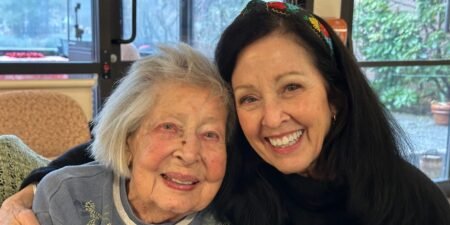When I married my husband, I knew I was marrying someone exceptional. He’s kind, generous, endlessly patient, and deeply devoted to helping others.
What I didn’t fully understand at the time was that I was also marrying a career. One that demands nearly every ounce of his time, energy, and emotional capacity. That’s because I married a surgeon.
We’ve been together since his first days of medical school
I thought medical school was the hard part. He went through four years of back-to-back exams, unpredictable schedules, and long nights spent studying. He graduated from medical school in 2024, we moved states for him to begin residency later that year, and we got married this May. And while residency has been hard for him, it’s also hard for me.
I learned how to be flexible, how to manage things on my own when needed, and how to celebrate small victories, such as when he passed exams and the weekend mornings he didn’t have to go to the hospital. But nothing really prepares you for residency.
I’d heard about the long hours, of course. Everyone familiar with life in medicine has. But hearing about it and being with someone living through it are two very different things. Averaging an 80-hour workweek might not sound that bad, but when you’re living it, you realize that it means you’re working more hours than you’re not, six days a week, sometimes seven. It’s consistent 13-hour shifts.
And for him, a “long shift” isn’t just a late night here or there. It’s months of overnight rotations. It’s waking up at 4:30 a.m. on a Saturday and not getting home until 9 p.m. on some days. It’s missing holidays, birthdays, and weekends. It’s walking through the door, emotionally drained after performing chest compressions for 36 minutes, or losing a patient you fought for all day.
Residency is all-consuming
As a partner, I’ve had to learn how to live alongside someone dealing with these things. That hasn’t always been easy. I’m not someone who naturally thrives on independence; I’ve always loved the closeness that comes with partnership.
So, finding myself navigating life more solo than expected, managing plans, meals, chores, and my own emotional highs and lows, has been a real adjustment. I’m not just sitting around waiting for him to walk through the door, but I’d be lying if I said I didn’t miss having him there more often.
What makes it harder is that there’s no true guidance
Most people don’t fully understand what it means to be married to someone in the early stages of medical training. His schedule isn’t his own. We can’t easily plan vacations. He can’t always promise he’ll make it to dinner. And when something small, like taking out the trash, gets overlooked, I have to remind myself that this is someone who just worked 14 hours trying to save lives.
In a typical relationship, you divide and conquer. But I’ve learned that in for us right now, support looks a little different. It’s picking up the slack without keeping score, and it’s knowing that love, right now, doesn’t always mean time together. Instead, it means empathy, patience, and staying tethered even when life pulls hard in another direction. It means listening to and consoling each other when we’ve had a tough day, even when the definition of “tough” looks drastically different in each of our jobs.
We first started living together when he was in medical school, and we had set tasks around the house. He was in charge of taking the trash out and cleaning the toilets, and I was in charge of vacuuming and laundry. Whoever cooked dinner, the other person cleaned up. We grocery shopped together. The last person out of bed had to make it.
Right now, in this phase of life, these tasks fall mostly on me. Sure, it took an adjustment period of getting used to, but I’ve learned that a strong relationship is less about keeping track of who’s doing what and more about how you can support and love your partner. And when he has the time to help, he absolutely does.
I don’t compare my relationship with others
There are plenty of Reddit threads sharing stories like mine, but I try not to read them. Every relationship is different, even within the medical world, and if I compare our relationship to others, there won’t be any winners.
What matters most is how we show up for each other — and we absolutely do. Sometimes that’s him staying up an extra 20 minutes after a grueling overnight shift to eat breakfast with me, and that small moment means everything.
Loving someone in residency means loving someone who’s being stretched to their absolute limits and choosing not to let that stretch tear you apart. It’s definitely not easy. But for us, it’s worth it.
Read the full article here

















